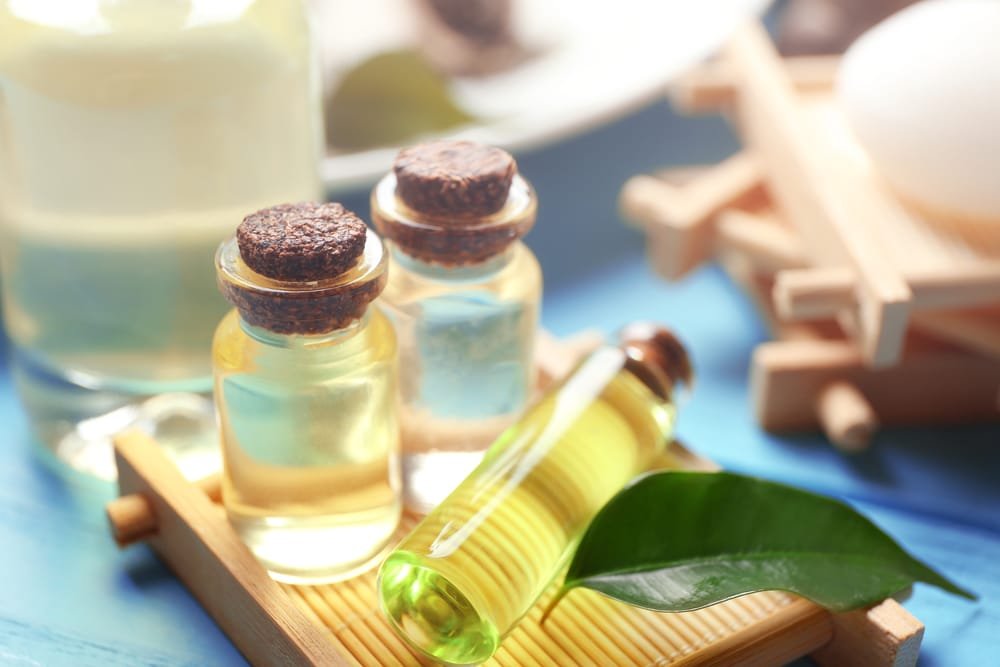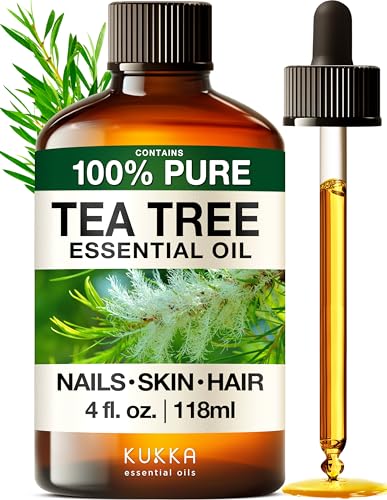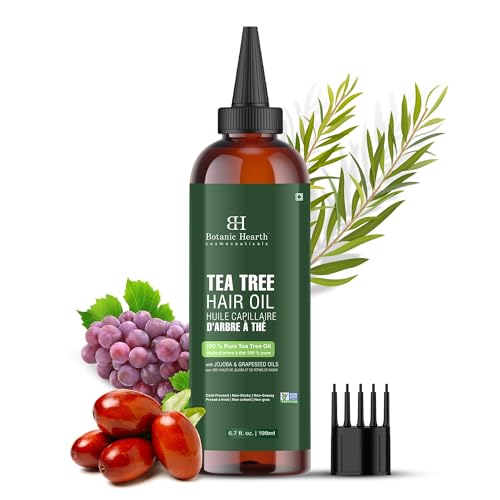Tea tree oil, known for its refreshing, medicinal aroma, has long been celebrated for its antimicrobial and anti-inflammatory properties. Extracted from the leaves of the Melaleuca alternifolia plant, native to Australia, tea tree oil has been used for centuries in traditional medicine to treat a variety of skin conditions.
In recent years, it has gained popularity in the beauty and hair care industries for its potential to improve scalp health and promote hair growth. This article explores the benefits of tea tree oil for hair growth, how it works, and how to use it safely and effectively.
What is Tea Tree Oil?

Tea tree oil is an essential oil derived from the leaves of the Melaleuca alternifolia tree. The oil is extracted through a process called steam distillation, which preserves its potent natural compounds.
Historical Uses
Tea tree oil has been used for centuries by indigenous Australians to treat wounds, skin infections, and respiratory conditions. Its powerful antiseptic, antifungal, and anti-inflammatory properties make it a versatile remedy for a range of health and beauty concerns.
Today, tea tree oil is a common ingredient in:
- Shampoos and conditioners
- Dandruff treatments
- Acne products
- Essential oil blends
Its ability to cleanse the scalp and create an optimal environment for healthy hair growth has made it a favorite in natural hair care routines.
Potential Benefits of Tea Tree Oil for Hair and Scalp
While tea tree oil doesn’t directly stimulate hair growth like medications such as minoxidil, its scalp-healing properties can indirectly support healthier, stronger hair.
1. Antimicrobial Properties
Tea tree oil is a natural antiseptic with powerful antimicrobial properties. It helps combat bacteria, fungi, and yeast that can cause scalp infections and hinder hair growth.



- Fights Scalp Infections: Conditions like folliculitis (inflamed hair follicles) and seborrheic dermatitis can slow hair growth. Tea tree oil helps eliminate the microbes responsible, promoting a healthier scalp.
- Reduces Itchiness: By controlling microbial growth, tea tree oil can alleviate itchy, irritated scalps.
2. Anti-Inflammatory Effects
Inflammation can damage hair follicles, leading to hair thinning or even hair loss. Tea tree oil’s anti-inflammatory compounds help to:
- Soothe irritated skin
- Reduce redness and swelling
- Create an environment where hair follicles can thrive
A calm, healthy scalp is crucial for consistent hair growth.
3. Dandruff Reduction
Tea tree oil is highly effective against dandruff, which is often caused by the yeast-like fungus Malassezia. Dandruff can clog hair follicles, leading to slower growth.
- Clears Flakes: Regular use helps reduce flakiness and scalp buildup.
- Balances Scalp Oils: It helps regulate sebum production, reducing both dryness and excess oiliness that can contribute to dandruff.
4. Unclogs Hair Follicles
Hair follicles can become clogged with:
- Dead skin cells
- Excess oil (sebum)
- Product buildup from gels, sprays, and conditioners
Clogged follicles restrict hair growth. Tea tree oil helps to:
- Dissolve buildup, allowing hair to grow freely
- Maintain clear pores, essential for healthy hair follicles
How to Use Tea Tree Oil for Hair Growth
While tea tree oil offers many benefits, it’s important to use it correctly to avoid irritation. Here are the safest ways to incorporate it into your hair care routine.
1. Dilution is Key
Tea tree oil is potent and should never be applied directly to the skin or scalp undiluted, as it can cause irritation.
- Dilution Ratio: Mix 2–3 drops of tea tree oil with 1 tablespoon of a carrier oil like coconut, jojoba, or olive oil.
- Why Dilute? Carrier oils not only prevent irritation but also add their own moisturizing and nourishing benefits to the scalp.
2. Scalp Massage
Massaging tea tree oil into the scalp stimulates blood circulation, promoting nutrient delivery to the hair follicles.
How to Do It:
- Mix a few drops of tea tree oil with a carrier oil.
- Apply the mixture to your scalp, focusing on problem areas.
- Gently massage in circular motions for 5–10 minutes.
- Leave it on for at least 30 minutes or overnight for deeper absorption.
- Rinse thoroughly with a mild shampoo.
Benefits: Scalp massages with tea tree oil can help reduce dandruff, improve circulation, and support overall hair health.
3. Add to Shampoo
For a simple daily solution:
- Add 5–10 drops of tea tree oil to your regular shampoo bottle (preferably sulfate-free).
- Shake well before each use.
- Massage the shampoo into your scalp for 2–3 minutes before rinsing.
This method helps maintain scalp cleanliness and prevent buildup without the need for extra steps.
4. Hair Masks
For an intensive treatment:
- Mix 2 tablespoons of coconut oil, 1 tablespoon of honey, and 5 drops of tea tree oil.
- Apply the mixture to your scalp and hair.
- Cover with a shower cap and leave it on for 30–45 minutes.
- Rinse with lukewarm water and shampoo thoroughly.
This mask not only nourishes the scalp but also conditions the hair, leaving it soft, shiny, and hydrated.
Precautions and Potential Side Effects
While tea tree oil is natural, it’s also highly concentrated. Incorrect use can lead to adverse effects, especially for those with sensitive skin.
1. Possible Allergic Reactions
- Symptoms: Redness, itching, burning sensations, or a rash.
- Patch Test: Always perform a patch test before full application. Apply a small diluted amount behind your ear or on your inner forearm and wait 24 hours. If no reaction occurs, it’s likely safe to use.
2. Avoid Direct Application
Applying undiluted tea tree oil directly to the scalp can cause:
- Chemical burns
- Severe irritation
- Dryness or flakiness
Always dilute with a carrier oil to reduce the risk.
3. Consultation
- Pregnant or Nursing? Consult with a healthcare professional before use.
- Pre-existing Skin Conditions: If you have conditions like eczema or psoriasis, speak with a dermatologist before applying tea tree oil.
4. Ingestion Warning
Tea tree oil is toxic if ingested. It should only be used topically and kept out of reach of children and pets.
Scientific Evidence and Limitations
What the Research Says
While tea tree oil’s antimicrobial and anti-inflammatory effects are well-documented, direct evidence supporting its role in stimulating hair growth is limited.
- Dandruff Control: A study published in the Journal of the American Academy of Dermatology found that a shampoo containing 5% tea tree oil significantly reduced dandruff symptoms without side effects.
- Improved Scalp Health: Healthier scalp conditions indirectly support hair growth by creating an environment where hair follicles can thrive.
- Antifungal Benefits: Tea tree oil has proven effective against fungal scalp infections, which can cause hair thinning if left untreated.
Limitations
- Not a Miracle Cure: Tea tree oil won’t reverse conditions like male pattern baldness or treat hormonal hair loss.
- Indirect Benefits: Its primary role is improving scalp health, which supports—but doesn’t directly trigger—new hair growth.
Conclusion
Tea tree oil is a natural powerhouse for maintaining a healthy scalp, which is the foundation of strong, healthy hair. Its antimicrobial, anti-inflammatory, and antifungal properties help:
- ✔ Combat dandruff
- ✔ Unclog hair follicles
- ✔ Soothe scalp irritation
- ✔ Promote an environment conducive to hair growth
Key Takeaways:
- Always dilute tea tree oil with a carrier oil before applying it to the scalp.
- Incorporate it into your routine through scalp massages, shampoos, or hair masks.
- Conduct a patch test to ensure you don’t have an allergic reaction.
- Tea tree oil is best used as part of a comprehensive hair care routine for maintaining scalp health.
While not a direct hair growth solution like some medical treatments, tea tree oil’s ability to improve scalp health can significantly support healthy hair growth over time.



Join the 7‑Day “Better Gut” Plan
Pop in your email and we’ll send Lesson 1 + the printable list.







